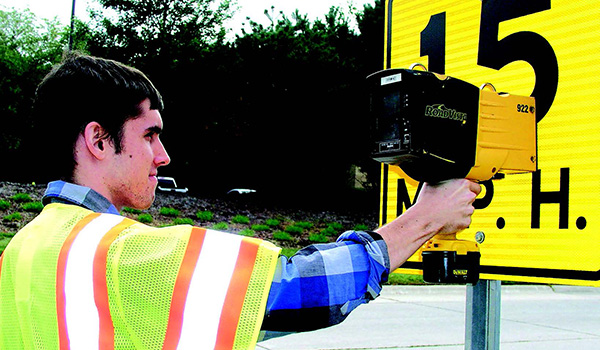The Purdue LTAP Connection

An LTAP undergraduate student measures the retroreflectivity of a street sign in West Lafayette. Retroreflective materials redirect the light from headlights back toward the vehicle.
For decades, hundreds of government departments in Indiana — as well as many Purdue Civil Engineering students — have greatly benefited from the Indiana Local Technical Assistance Program, known as LTAP.
Indiana LTAP, which started 60 years ago at Purdue University just after New York launched a similar program, is part of a nationwide system of technology transfer centers. Established by the Federal Highway Administration, LTAP is intended to improve transportation department performance. The agency helps street departments, county highway departments and local elected officials to better meet the needs of the public by acting as a resource for training, technical assistance and technology transfer.
“One of the best ways to look at LTAP is as a technology transfer agency,” says Rich Domonkos, LTAP program manager. “Much of what we do is identify the needs for towns, cities and counties and then help meet their needs through transportation department and road improvements.”
LTAP helps governmental agencies oversee more than 80,000 miles of roadway in all 92 Indiana counties. Indiana LTAP’s avenues for outreach include workshops, conferences and programs — as well as physical resources such as the popular Equipment Loan program. LTAP manages the Road Scholar certification program and the Hazard Elimination Program for Existing Roads and Streets (HELPERS).
Additionally, by providing work and research experience for students in the Lyles School of Civil Engineering, LTAP serves as an excellent source of knowledge.
“Our department serves as a great place for both undergraduate and graduate students to gain firsthand, in-the-field experience in both transportation engineering and partnerships with government agencies,” says John Haddock, Purdue professor of civil engineering and LTAP program director. “There’s only so much a student can learn in a classroom, so those who gain additional experience in a program like LTAP not only deepen their understanding of civil engineering, they also become far more desirable to future employers.”
For some former students, not only did they gain invaluable, real-world experience, they went on to benefit from LTAP as professional engineers.
One such former student researcher is Jennifer Sharkey, Purdue Civil Engineering alumna (MSCE ’09) and Steuben County engineer.
“It was a wonderful, eye-opening experience for me as a student,” Sharkey says. “Through the LTAP program, I was able to gain a wealth of experience — both in research and by working with local government agencies. As a student, I found the work was also really rewarding.”
Now, as a county employee herself, Sharkey says LTAP has been a tremendous help to her and Steuben County. LTAP helped county administrators develop information about implementing a wheel tax as well as understand how the tax would improve their transportation network. In the end, the information and assistance provided directly aided Steuben County officials in their eventual approval of the wheel tax.
“My experience with LTAP as a professional engineer only furthered my appreciation for what they do,” Sharkey says. “They are a vital resource in Indiana, and I am happy our state has such an outstanding agency located at Purdue.”
